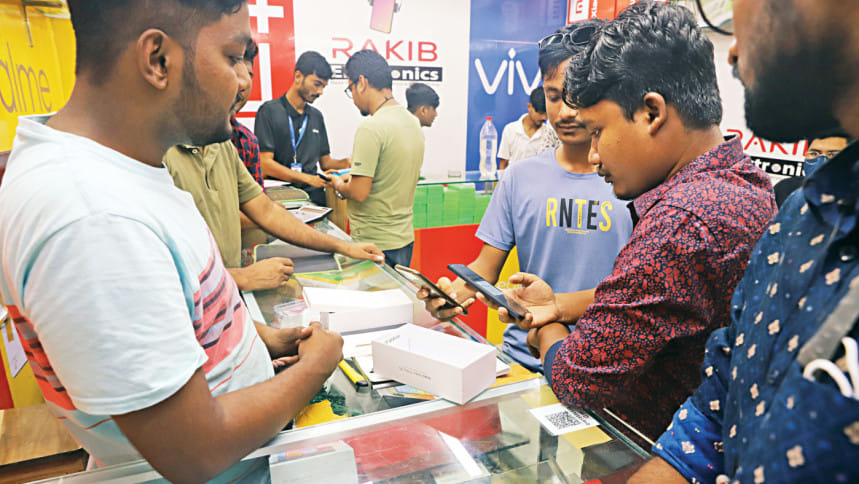Smartphone shipment shrinks

The smartphone market in Bangladesh witnessed a double-digit decline for the first time in seven years in 2022 while the feature phone market grew slightly at the same time, according to the latest Market Monitor report by Counterpoint Research.
In its report, the global market research company said Bangladesh's smartphone shipments declined 23 per cent year-on-year in 2022.
The decline in the domestic smartphone market was due to high inflation as well as deteriorating consumer demand and price hikes while additional taxes also contributed.
Counterpoint tracks and analyses the global smartphone industry. Here, smartphone shipments refer to the number of smartphones that have been sent from manufacturers to retailers or carriers in a given time period.
The high inflation levels, macroeconomic crisis, disruption of the global supply chain, increased import duties and newly imposed value-added tax (VAT) all contributed to the decline, the research found.
The feature phone market grew 4 per cent year-on-year in 2022 due to the weakened transition to smartphones caused by price hikes in the second half of the year.
The report showed that smartphone's share in overall handset shipments declined to 39 per cent in 2022 from 46 per cent in 2021.
"The year started with weak consumer demand due to geopolitical uncertainties and rising inflation. An increase in import duties in the September-ended quarter combined with the application of VAT in the December-ended quarter aggravated the situation and led to Bangladesh's first double-digit smartphone shipment decline in seven years," said Research Analyst Akshay RS.
"At the same time, the opening of letters of credit for components became harder due to declining foreign currency reserves. This led to a reduction in the production of local handset manufacturers," he added.
However, Counterpoint hasn't provided the data on how many mobile phones have been shipped to the market.
According to the Bangladesh Telecommunication Regulatory Commission (BTRC), 1.01 core smartphones were manufactured locally and 60,899 smartphones were imported by Bangladesh in 2022.
However, the grey market now accounts for over 20 per cent market share of the smartphone market, according to Mohammad Mesbah Uddin, chief marketing officer of Fair Electronics, Samsung's local assembly partner.
As per Counterpoint's research, 5G smartphone shipments exceeded 1 million units for the first time in 2022, growing at 151 per cent year-on-year. The share of 5G smartphones in Bangladesh's smartphone market also reached an all-time high of 17 per cent in 2022 compared to 9 per cent in 2021.
Meanwhile, 2.06 lakh 5G smartphones were locally manufactured, shows BTRC data. This indicates that a big share of top-quality phones entering the local market is not manufactured in Bangladesh.
Telecom Minister Mustafa Jabbar also acknowledged the recent surge of the grey smartphone market in Bangladesh, which has become a big headache for local manufacturers.
"We have informed the authorities concerned to stop the inflow of phones that have been smuggled into the country. If this is not stopped immediately, the industry will face a severe backlash," Jabbar told The Daily Star recently.
The research found Xiaomi reached its highest-ever shipments in 2022 to become the number one smartphone brand for the first time. The brand almost doubled its volume in 2022 compared to 2021 riding on strong sales of low-price phones.
Samsung slipped to second position with a market share of 13 per cent in 2022 for weak smartphone imports as spiralling import costs, reduced focus on the entry-level segment and fewer launches in the mid segment led to an overall decline.
realme slipped to the third spot with an 11 per cent market share while Vivo and OPPO secured fourth and fifth spots respectively with 10 per cent and 9 per cent market share.
Bangladesh's overall mobile handset market declined 8 per cent year-on-year in 2022.
Symphony, which manufactures both smartphones and feature phones, maintained its top position in the handset market, capturing a 26 per cent share.
Symphony also retained its top position in Bangladesh's feature phone market, capturing a 37 per cent share, followed by itel, Nokia HMD and Walton.
Xiaomi and Nokia HMD's shipments increased significantly as they continued to focus on improving localisation and pricing strategies to make smartphones affordable.

 For all latest news, follow The Daily Star's Google News channel.
For all latest news, follow The Daily Star's Google News channel. 










Comments